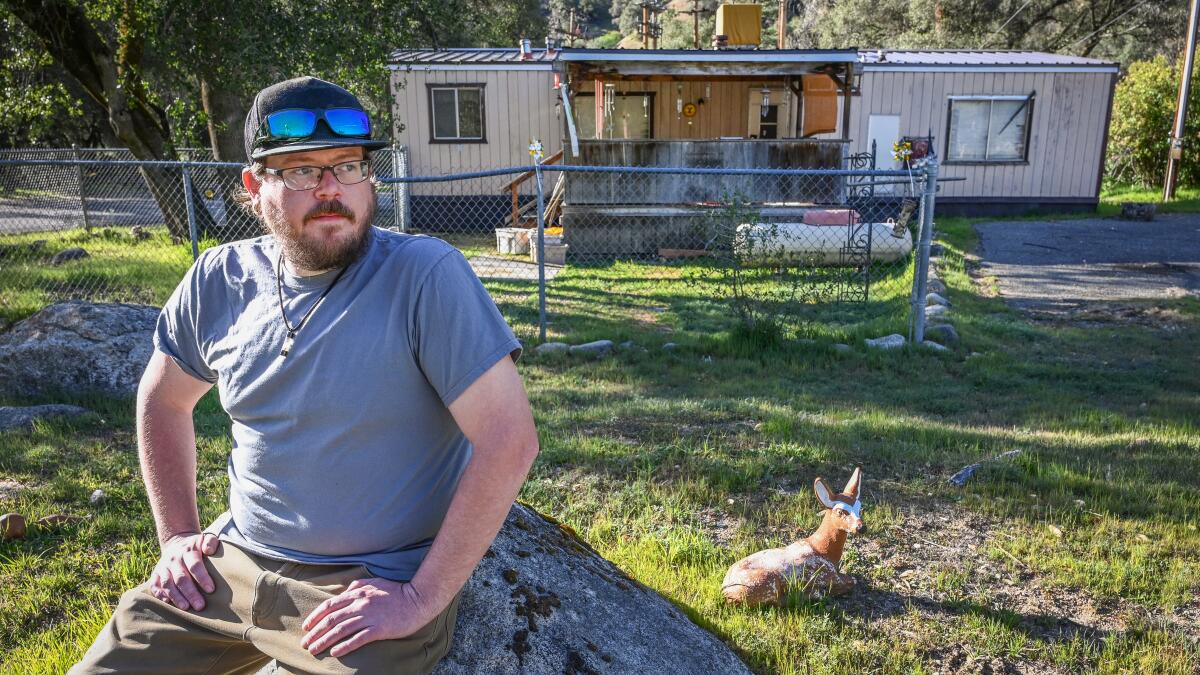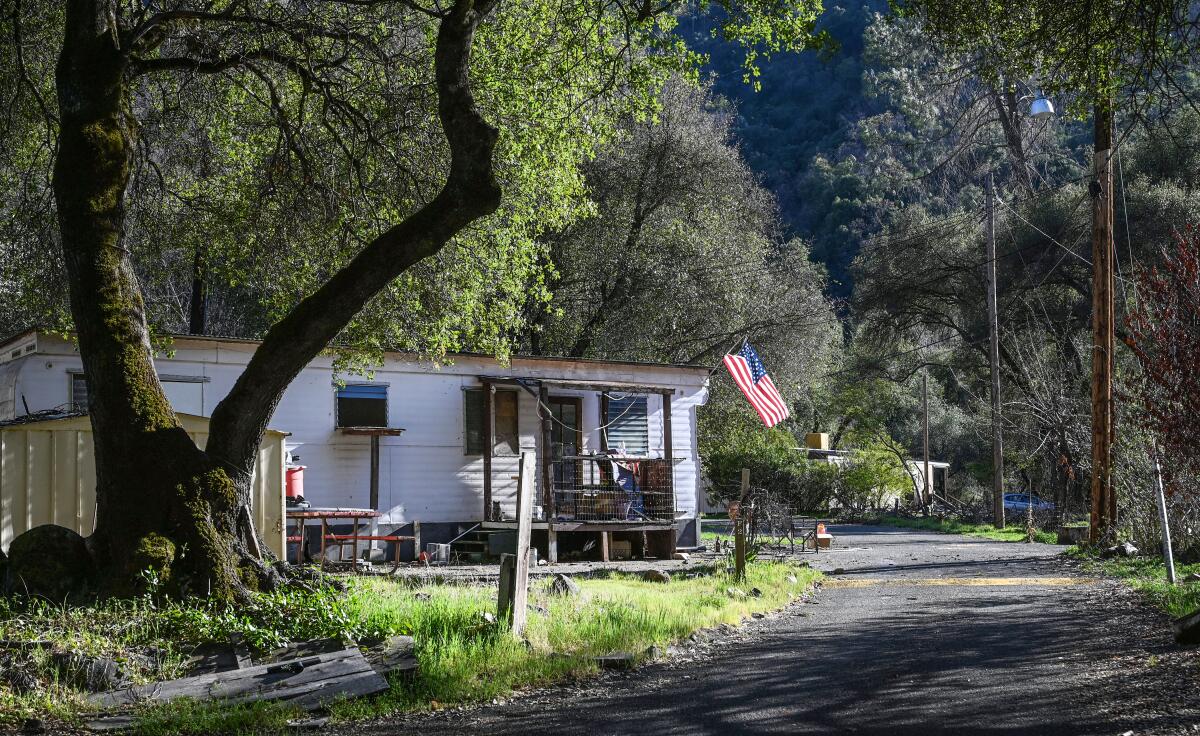Yosemite trailer park residents forced to leave because of aging power lines, a fire hazard

- Share via
Less than two miles from Yosemite National Park, the El Portal Trailer Park sits alongside the Merced River in a tranquil mountain valley surrounded by oak and pine trees.
After spring showers, Luke Harbin could sometimes see a natural waterfall off the canyon walls from his backyard.
But no longer.
Over the weekend, Harbin, his mother, Lynn, and a dozen of their neighbors packed their belongings and said goodbye to the place they have called home, in some cases, for decades. All worked for the National Park Service or a concessionaire business, such as a hotel.
The park service, which owns the land that the trailer park sits on near Highway 140, notified residents in December that the federal government would shut down the site because of deteriorating overhead power lines. Residents were given a 90-day notice that they would have to leave.
For years, residents have found themselves caught in a quagmire between federal and local jurisdictions. They leased the land from the park service, paid the federal government for electricity and sought remodeling permits from Mariposa County.
In October, the park service announced the utility company Pacific Gas & Electric would assess the power lines at the trailer park. The federal agency also informed residents that the area was slated to become a campground for recreational vehicles and that construction on the project would begin in 2024.
Tenants were not immediately ordered to leave, however. They were told that would depend on the condition of the power lines.
Then, in December, residents received another letter from the park service giving them 90 days to clear out.
“We all just kind of looked at each other, because they’ve tried to kick us out so many times in the past. We thought, well, maybe this is a joke,” Luke Harbin, 32, said when reached by phone. “The park service keeps changing their ideas and plans for the area.”
The decision to close El Portal Trailer Park did not come lightly, Yosemite National Park Supt. Cecily Muldoon told The Times. The multiple reviews of the power lines in the area, including the assessment from PG&E, showed a real fire hazard.
“As you know, all of California is fire country, but this is absolutely fire country,” Muldoon said. “It made us very uneasy about the risk to human life.”
For years, El Portal Trailer Park residents were informed about other projects that would have repurposed the land and closed the park, but none of those plans materialized. In 2014, the National Park Service released the Merced River Plan, which acts as a guidebook for the river’s management and outlines plans to remove the trailer park in El Portal. But residents thought there would be more time.
“For decades, there have been plans,” said Greg Magruder, a member of the El Portal Planning Advisory Committee, a group that works with the county to address local issues. The Park Service is “great at planning and really crappy at carrying those plans out,” he said.
Magruder, who is retired, lives outside the trailer park but leases his property from the National Park Service. He says many of the residents are employees who have worked for the park service or one of the concessionaires for decades. Though Muldoon would have liked to have given the residents at least a year’s notice before their lease agreements were terminated, the electrical hazard sped up that timeline.
“We really had a duty to act,” Muldoon said. “Once the severity of that electrical hazard came to light, we were worried every day. From the time we found that out to the time we depowered it a couple of days ago. Just an errant spark and a fire getting started there could have taken people’s lives. We may be getting bad press now, but the real bad outcome would be if somebody got hurt out there.”
Muldoon described the one-on-one meetings she’s had with tenants as tough and a “fundamentally sad situation.”
In the next few years, the trailer park will transition from a residential zone to an administrative site that can accommodate the new campground. Repairing the power lines would not have received as high a priority based on the other infrastructure projects around Yosemite National Park.
The steps the federal agency took to remove residents is considered by some a legal gray area, largely because the residents’ homes remain on the property. National Park Service spokesperson Denise Adamic said agency officials looked into whether they could compensate the residents, but “have not found a viable legal authority.”
Robert Cortez, an attorney with the Central California Legal Services Inc., represents two former residents at the trailer park and typically helps residents fight unlawful detainers or evictions. But Cortez said the trailer park residents technically were not served eviction notices. The December letter terminated the tenant’s lease agreement but did not mention any repurposing plans for the site, Cortez said.
Typically, these types of cases take place in state courts where tenants can challenge their landlord. Cortez said the park service’s actions with the El Portal residents fits a textbook definition of eviction where a landlord makes a property so deplorable that they can no longer live there.
The park service turned off the power to the trailer park over the weekend and installed a new fence around the property. Residents were also threatened with six months jail time or a $5,000 fine for trespassing and illegally residing on federal land.
“In my opinion, that’s a constructive eviction. The landlord did not physically pull anyone out of their property,” Cortez said. But the landlord in this case did successfully remove the tenants.
Lynn Harbin has lived in her home for 38 years. Her son Luke grew up there and moved back home a few years ago.

On Wednesday, Luke Harbin packed his family’s belongings in his car. The whole experience has been traumatizing for him and his mother, who broke down crying during a meeting with park service management. They said the staff seemed unfazed by the fact that they were losing their home.
Luke Harbin planned to store his belongings 100 miles away in a storage unit in Fresno. Lynn and several other former residents of the trailer park were offered rooms in an employee dorm through a concessionaire. But the same offer was not made to Luke.
“I’m staying at a buddy’s place, living in my car,” he said.
More to Read
Sign up for Essential California
The most important California stories and recommendations in your inbox every morning.
You may occasionally receive promotional content from the Los Angeles Times.













